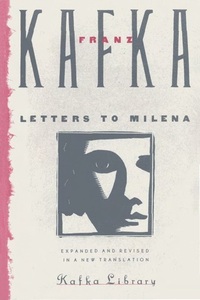You need to sign in or sign up before continuing.
Take a photo of a barcode or cover
Una raccolta di lettere da parte dello scrittore Franz Kafka indirizzate alla sua traduttrice Milena, diventata per lui un’amicizia importante nel corso degli anni, anni in cui egli si sentiva un po’ soffocare dalla vita che conduceva e dai suoi rapporti. L’andamento è interessante perché fa capire un po’ la solitudine che prova l’autore, e ci sono delle frasi che, in realtà, sono davvero molto belle e mi hanno colpita. Una volta compreso meglio il suo modo di esporsi, il tutto diventa più affascinante, tuttavia, per il resto, è un no. Non racconta di suoi eventi in modo troppo emozionante, sembra più una fissa nei confronti di Milena, anche se non malsana. La parte emozionante è come si sente lui in generale, ma finisce lì.
i love this obsessive miserable freak. constantly trying to explain something inexplicable
emotional
slow-paced
Milena y Max se merecen el infierno, los odio. Cómo publicaron esas cartas?? Kafkita te amo.
emotional
sad
fast-paced
Una raccolta di lettere meravigliosa quanto straziante. Kafka ama Milena con un’intensità quasi insopportabile, ma non riesce a permettersi di vivere davvero questo amore. Troppo consapevole della propria sofferenza, abituato a tormentarsi per ogni parola, a crogiolarsi nel senso di colpa, resta paralizzato nei suoi dubbi.
Milena gli tende la mano, cerca di spronarlo, di combattere contro la sua angoscia e la sua malattia : "Vieni a Vienna o non scrivermi più", ma lui rimane imprigionato in se stesso.
"Ma qui è diverso, Milena, infatti per me tu non sei una donna, tu sei una ragazza, e non ho mai visto nessuna che fosse più "fanciulla" di te, e io, fanciulla, non oserò porgerti la mano, questa mano sporca, contorta, adunca, irrequieta, malcerta, bollente e gelida."
Kafka non riesce ad allontanarsi da lei, ma nemmeno a starle vicino: si ritira ogni volta che si avvicina troppo. Brucia le lettere, le dice di non scrivergli più, ma poi, anche dopo anni di silenzio, si ritrovano ancora a cercarsi, a parlarsi. Questa loro necessità e allo stesso tempo impossibilita di stare insieme è quasi violenta.
"La felicità di averti qui e di sapere che fai parte di me. E dire che in fondo non è te che amo, ma qualcosa che va oltre, il dono che tu mi fai della mia stessa esistenza".
Le parole che Kafka riserva a Milena sono meravigliose, ma è la distanza, il continuo oscillare tra il desiderio e la rinuncia a rendere questo amore così umano e straziante.
"A volte ho l'impressione che è come se avessimo una camera con due porte, l'una di fronte all'altra, ognuno stringe la maniglia della sua porta e basta un batter di ciglia dell'uno perché l'altro balzi dietro la propria porta e il primo non fa in tempo a dire una parola che il secondo ha già chiuso la sua porta ed é sparito. Poi certo la riaprirà, perché quella è una stanza che forse non si può abbandonare. Se solo il primo non fosse esattamente come il secondo, se solo fosse calmo e preferisse dare l'impressione di non guardare verso l'altro, e rimettesse semplicemente in ordine la stanza come si fa con una camera qualunque; e invece si comporta esattamente come l'altro e spesso sono addirittura entrambi dietro le rispettive porte, con la bella stanza che resta tutta vuota.
Da qui nascono malintesi che danno il tormento."
This book just blew me to bits and pieces. It showed all 5 phases of grief and all 7 phases of Love. Even though Milena was married to someone and Kafka was engaged multiple times, he just couldn’t give the intimacy and love to his partners because all his love was for just one woman: Milena.
Milena’s behaviour on the other hand was quite confusing where at some places it seemed like she was in love with Kafka but at some places she was the one who suggested that they have no future and should part ways, and how she loves her husband more.
The going back and fourth was something that occurred less frequently in the beginning but as their relationship progressed she became more uncertain and then we see the phrases like
“And actually it is not you at all I love, but rather the existence you have bestowed on me”
and
“I was reading my destiny inside your eyes without knowing it.”
Their chemistry goes smooth really fine, they even meet once, then after some time, the beginning of the end begins, and there are problems getting the letters to each other and Milena asks Kafka that they should stop writing and how she cannot leave her husband (Ouch).
And then we get to the 6th stage of love (Madness/Junoon) and 4th stage go grief(Bargaing) shows up in the letters where we see lines like:
“remember a human can't last for long without a heartbeat, and as long as you are turned away how can my heart go on beating?”
The book was so damn relatable I could’t even put it down at times.
There were no trigger warnings but the book triggered me on an entirely different level, I already loved Kafka’s work but now after reading Letters to Milena it went up another notch. I’ll definitely be picking up letters to father really soon.
Milena’s behaviour on the other hand was quite confusing where at some places it seemed like she was in love with Kafka but at some places she was the one who suggested that they have no future and should part ways, and how she loves her husband more.
The going back and fourth was something that occurred less frequently in the beginning but as their relationship progressed she became more uncertain and then we see the phrases like
“And actually it is not you at all I love, but rather the existence you have bestowed on me”
and
“I was reading my destiny inside your eyes without knowing it.”
Their chemistry goes smooth really fine, they even meet once, then after some time, the beginning of the end begins, and there are problems getting the letters to each other and Milena asks Kafka that they should stop writing and how she cannot leave her husband (Ouch).
And then we get to the 6th stage of love (Madness/Junoon) and 4th stage go grief(Bargaing) shows up in the letters where we see lines like:
“remember a human can't last for long without a heartbeat, and as long as you are turned away how can my heart go on beating?”
The book was so damn relatable I could’t even put it down at times.
There were no trigger warnings but the book triggered me on an entirely different level, I already loved Kafka’s work but now after reading Letters to Milena it went up another notch. I’ll definitely be picking up letters to father really soon.
نامه به مثابه شکنجه برای یک عشق ناممکن.
«حیوان تازیانه از دست اربابش وامیگیرد و خود خود را تازیانه میزند تا مگر ارباب شود، غافل از آنکه این انحراف چیزی نیست جز توهمی که فقط ناشی از پیدا شدن گرهی تازه در پیچ و خم تازیانه ارباب است»
«حیوان تازیانه از دست اربابش وامیگیرد و خود خود را تازیانه میزند تا مگر ارباب شود، غافل از آنکه این انحراف چیزی نیست جز توهمی که فقط ناشی از پیدا شدن گرهی تازه در پیچ و خم تازیانه ارباب است»
emotional
sad
medium-paced
challenging
emotional
informative
reflective
slow-paced




